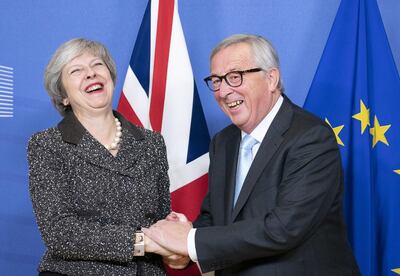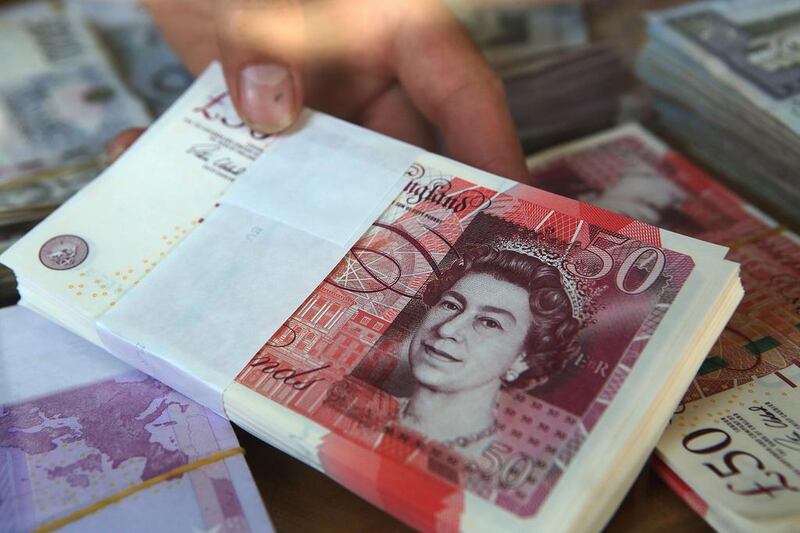Last November, Britain's treasury warned that regardless of whether the UK crashes out of the European Union with or without a deal, Brexit would be bad for the economy.
Far from the promises made to Leave voters during the referendum in 2016, the finance ministry has estimated that the economy could shrink by up to 3.9 per cent after 15 years under British Prime Minister Theresa May's plan, or reduce by as much as 9.3 per cent without an agreement.
But even before the March 29 deadline, Brexit's negative effect is starting to be felt. This is because after almost two years of negotiations, no one is any closer to understanding what life outside of the world's largest trade bloc will look like.
The persistent uncertainty has weighed on the currency. At the beginning of the year, pound sterling traded above $1.35 (Dh4.96) but by December, as Mrs May struggled to convince parliament of her withdrawal agreement, it was sitting at around $1.26.
“The pound is very reactive to whatever goes on and at the moment the market does not know which way the Brexit process is going to lurch,” said Laith Khalaf, senior analyst at financial services company Hargreaves Lansdown.
The prospect of Britain crashing out of the EU without a deal – a so-called hard Brexit – started to look more likely as the year progressed. Divisions in the ruling Conservative Party over how the UK should exit the EU have led to the resignations of several high-profile ministers beginning in July – Brexit secretary David Davis, followed by foreign secretary Boris Johnson.
______________
Read more:
Britain to double funds for no-deal Brexit preparations
[ Opinion: Europe will also suffer from a no-deal Brexit ]
______________
As senior minister Liam Fox and Bank of England governor Mark Carney began to issue warnings of a no-deal Brexit, the pound tumbled to 1.2759 against the dollar in August.
While sterling rebounded in November in reaction to the news that Mrs May had agreed a withdrawal draft with the EU, it fell sharply again after two more senior government ministers resigned.
In early December, when Mrs May pulled a key parliamentary vote on the agreement and then faced a no-confidence vote in parliament, sterling dropped to a 20-month low at $1.2562.

Mihir Kapadia, chief executive and founder of Sun Global Investments, said the prime minister's struggle to convince parliament of her agreement had led to increased concerns over the prospect of no-deal.
He said this threat was "likely to add to more pressure on the pound".
Aside from the falling pound, Britain's economy, the fifth largest in the world, was the slowest growing in the G7 for the first six months of 2018. It was one of the fastest growing between 2013 and 2016.
“Economic growth has been sluggish this year,” said Mr Khalaf. “But it has not been disastrous and we are not in recession.”
It would be wrong to say the slowdown is a direct cause of the Brexit process. But industry bosses from the struggling manufacturing, property and retail sectors have cited uncertainty as a factor driving down sales.
As well as consumer confidence, investor trust in the UK is low. The country's equity funds lost a record $9.8 billion in 2018, data from Bank of America Merrill Lynch revealed this month. Investors, spooked at the prospect of a no-deal Brexit, have been taking out protection from government debt that the price of this insurance surged by 36 per cent in one month.
While no-deal fears are becoming more pronounced, other alternatives to break the Brexit deadlock, including a general election or a second Brexit referendum, have done little to lift investor confidence.
At the beginning of the year, an election at such a crucial time in the Brexit negotiations seemed out of the question. But after Mrs May narrowly survived the no-confidence ballot brought about by members in her own party, calls by opposition party Labour and its socialist leader Jeremy Corbyn for a fresh nationwide vote has grown louder.
If elected, Mr Corbyn has promised to reform the city of London as well as nationalising companies that operate trains, water and some parts of the energy network.
"Businesses don't really like the idea of what Jeremy Corbyn has to offer in terms of his policies," Naeem Aslam, chief market analyst at Think Markets UK told The National.
“If a general election does happen then we are talking about at least another four or five months of uncertainty, which would mean more devaluation in the currency, more turmoil for Britain’s equity market and more deterioration in confidence for the market as well.”
Growing support by MPs for a second referendum – which has been consistently ruled out by Mrs May – has done little to assuage fears about a no-deal Brexit. While some analysts believe a second vote would help drive sterling up, others believe it could create further
uncertainty.
“The longer this issue drives on, the worse it is for the economy,” said Mr Aslam.
“Everyone wants to see some kind of resolution. But given the divide in parliament and in Britain as a whole, it seems we are no closer to achieving it.”








